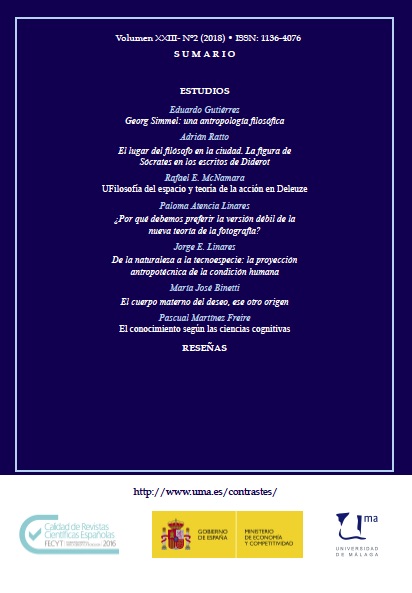Knowledge according to cognitive sciences
DOI:
https://doi.org/10.24310/Contrastescontrastes.v23i2.5575Keywords:
Knowledge, cognition, Turing, Newell, Simon, proper cognitionAbstract
After a brief description of cognitive sciences, the existence of two mistaken approaches in philosophy of knowledge is emphasized (the one is the historical-scholar and the other is the merely speculative) betting on the approach proper of cognitive sciences, where the subject of cognition is an information processor (following Alan Turing ?s idea) and it can be not only a human but also a machine or an animal. Secondly the cognitive subject is characterized as a physical symbol system (PSS), according to the thesis by Allen Newell and Herbert Simon, and such thesis is commented and illustrated. And finally diverse degrees of cognition in general sense, in animals and in machines, are distinguished, but also it is highlighted the proper or intelligent cognition, comprising the operations of conceiving, judging and reasoning.
Downloads
Metrics
Publication Facts
Reviewer profiles N/A
Author statements
Indexed in
-
—
- Academic society
- N/A
- Publisher
- Universidad de Málaga
References
Bobrow, Daniel G., Collins, Allan (eds.), Representation and Understanding. Studies in Cognitive Science, Academic Press, Londres, 1975.
Canals Vidal, Francisco, Sobre la esencia del conocimiento, Promociones Publicaciones Universitarias, Barcelona, 1987.
Lindsay, Peter, Norman, Donald, Human Information Processing: An Introduction to Psychology, Academic Press, Nueva York, 1972.
McCorduck, Pamela, Machines Who Think, Freeman, Nueva York, 1979.
Martínez-Freire, Pascual F., «El impacto de las ciencias cognitivas en la filosofía del conocimiento», P. F. Martínez-Freire (coord.), Filosofía y ciencias cognitivas,
Philosophica Malacitana, Suplemento nº 3, 1995, pp. 51-66.
———, «Filosofía de la robótica inteligente», Antonio Diéguez y José María Atencia (coords.), Genes y Máquinas, Universidad de Málaga, Málaga, 2006, pp. 327-347.
———,, La importancia del conocimiento. Filosofía y ciencias cognitivas (2ª ed.), Netbiblo, La Coruña, 2007.
Maturana, Humberto, «Biology of Cognition», H. Maturana y Francisco Varela, Autopoiesis and Cognition, Reidel, Dordrecht, 1980, pp. 1-58.
Moravec, Hans, «Today´s Computers, Intelligent Machines and our Future», Analog, 99, 2, febrero 1979, 59-84.
Newell, Allen, «Physical Symbol Systems», Cognitive Science, 4, 1980, 135-183.
Newell, Allen, y Simon, Herbert, Human Problem Solving, Prentice-Hall, Englewood Cliffs (NJ), 1972.
———, «Computer Science as Empirical Inquiry: Symbols and Search», Communications of the Association for Computing Machinery, 19, marzo de 1976, 113-126.
Norman, Donald A., Rumelhart, David E. (eds.), Explorations in Cognition, Freeman, San Francisco, 1975.
Piaget, Jean, Biología y Conocimiento (trad. Fco. González Aramburu), Siglo XXI, Madrid, 1969.
Santo Tomás, Juan de, Ars logica seu de forma et materia ratiocinandi, B. Reiser (ed.), Marietti, Casali, 1948.
Searle, John, «Minds and Brains without Programs», Colin Blakemore y Susan Greenfield (eds.), Mindwaves, Blackwell, Oxford, 1987, pp. 209-233.
Turing, Alan M., «On Computable Numbers», Martin Davis (ed.), The Undecidable, Haven, Hewlett (New York), 1965, pp. 116-154.
———, «Maquinaria computadora e inteligencia» (trad. Fco. Martín), Alan Ross Anderson (ed.), Controversia sobre mentes y máquinas, Orbis, Barcelona, 1987, pp. 11-52.
Downloads
Published
How to Cite
Issue
Section
License
This journal provides immediate free access to its content under the principle of making research freely available to the public. All content published in Contrastes. Revista Internacional de Filosofía, are subject to the Creative Commons Attribution-NonCommercial-ShareAlike 4.0 license whose full text can be found at <http://creativecommons.org/licenses/by-nc-sa/4.0>
It is the responsibility of the authors to obtain the necessary permissions of the images that are subject to copyright.
Authors whose contributions are accepted for publication in this journal will retain the non-exclusive right to use their contributions for academic, research and educational purposes, including self-archiving or repository in open access repositories of any kind.
The electronic edition of this magazine is edited by the Editorial Service of the University of Malaga (Uma Editorial), being necessary to cite the origin in any partial or total reproduction.










5.png)
